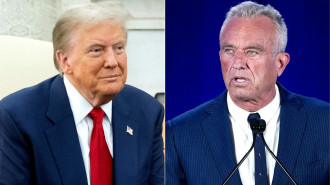Controversial Khomeini posters 'not designed to stir-up Saudi Arabia'
Abdel Latif al-Menawy said that the network did not represent his country in an interview with CNN and denied rumours the images of Imam Khomeini were a political declaration.
"Some people felt that the Egyptian state wanted to enrage Saudi Arabia by raising the image of the Iranian Supreme Leader in Egypt," said Menawy.
"This is not true, as I said, because we do not officially represent the Egyptian state."
The billboards, which line various prominent highways in Cairo, have aroused controversy as they show a large image of Khomeini taking a selfie with famous buildings from the Gulf in the background.
Menawy said he thought a "crisis had arisen" for three reasons that were related to sensitivity in the region.
"The first reason was related to extreme sensitivity, which was a surprise for me; the second was related to political tension and thirdly due to geopolitical monitoring in some cases," he said.
Menawy added that the posters had not been designed to inspire anger, but to "reach out" to their viewers.
Al-Ghad is owned by Mohammad Dahlan, who was exiled from the Palestinian party Fatah following in-fighting with Palestinian President Mahmoud Abbas.Saudi Arabia and Egypt are currently experiencing a lull in relations between the two countries, after Egypt announced its support for the Syrian regime and opened communications with Hizballah and Iran.








![The meeting between Musk and Iravani was 'positive', Iranian sources said [Getty]](/sites/default/files/styles/image_330x185/public/2024-11/GettyImages-2184077711.jpg?h=f5c1ac2a&itok=Wb2mIhsF)
![Dutch politicians have used harsh rhetoric against the country's Muslims following Israeli-instigated violence [Getty]](/sites/default/files/styles/image_330x185/public/2024-11/GettyImages-2184046796.jpg?h=199d8c1f&itok=3kSTEWRC)